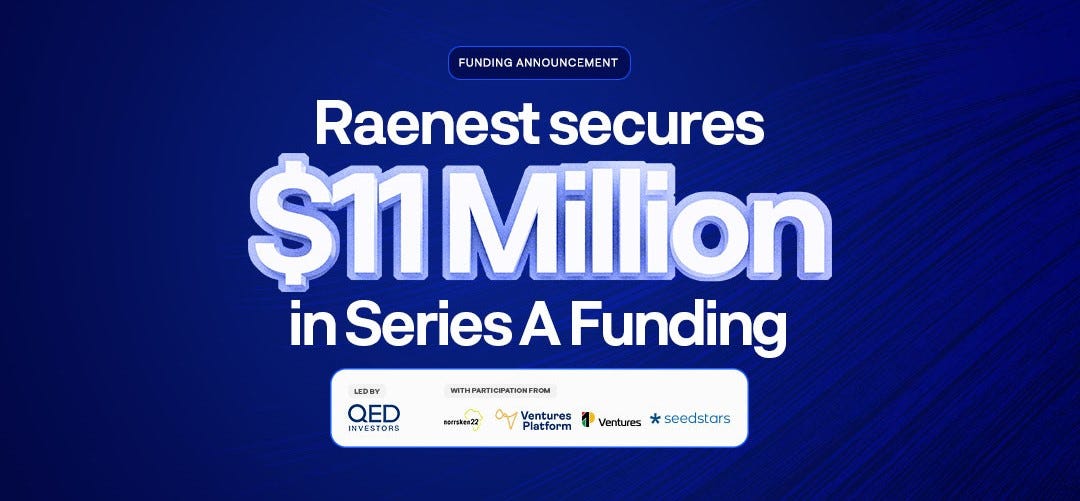Happy Monday!
We are happy to let you know that we launched our Podcast! Tech Tides Africa Podcast is Live! 🚀
In the first episode, we unpack a series of transformative tech developments across Africa. First, we explore Uganda’s $16.87 million central bank hack. Next, we dive into Nigeria’s bold vision of achieving 70% internet penetration by 2025. We also examine how Safaricom and key Kenyan banks are pushing for Pesalink to boost digital payments. Finally, we highlight Flutterwave CEO’s new venture studio, Resilience17, which is set to invest $200,000 in promising AI startups.
🔥 Stay ahead of Africa’s tech evolution! Listen now
Here’s what else we have lined up for you this week:
Nigeria & Kenya Launch Stablecoins
Raenest Secures $11M Series A to Expand Cross-Border Payment Solutions
Understanding the Factors Behind Zoto's Shutdown
That’s not all; we also have other interesting reads, funding opportunities, people building cool stuff, and job openings at leading tech companies.
Nigeria & Kenya Launch Stablecoins
Nigeria and Kenya announced the launch of their respective stablecoins, cNGN and cKES, which are pegged 1:1 to their local currencies.
Nigeria’s cNGN, developed by the African Stablecoins Consortium, is regulated and ready for adoption. Under Nigeria's regulatory incubation program, it is now available on SEC-licensed platforms like Busha and Quidax.
The launch of this stablecoin aims to streamline payments and remittances, crucial for a country with high crypto adoption and increasing demand for seamless cross-border transactions. cNGN is launching on multiple blockchains, including Assetchain, Bantu, Base, Binance, Ethereum, Polygon, and TRON, though Bantu remains the primary issuance network. As of February 5, 4,400 cNGN tokens (₦66M) were in circulation and held by 13 individuals across six blockchain networks.
The country’s earlier eNaira initiative, Nigeria's Central Bank digital currency, has struggled with adoption, making cNGN’s adoption journey one to watch out for.
Meanwhile, in Kenya, Swypt, a DeFi platform, launched the Celo Kenyan Shilling (cKES), the country's first stablecoin built on the Celo blockchain. Founded by David Thoyah in June 2024, Swypt seeks to enhance cross-border transactions by offering a secure alternative to traditional banking systems.
While cKES offers promising solutions, Kenya’s evolving regulations could impact its growth. The proposed 2025 Virtual Assets Service Providers Bill would require crypto firms to establish local offices and appoint executives subject to regulatory approval. Additionally, the Finance Act 2023 imposes a 3% tax on digital asset sales, including cryptocurrencies and NFTs, both of which might potentially affect the success of this initiative.
Nigeria and Kenya are making strategic moves in digital finance with the launch of their respective stablecoins. How these stablecoins evolve, and whether they gain widespread adoption, will provide valuable insights into the future of crypto in Africa
Raenest Secures $11M Series A to Expand Cross-Border Payment Solutions
Nigeria-based cross-border remittance company Raenest has raised $11 million in a Series A funding round led by QED Investors, with participation from Norrsken22, Ventures Platform, P1 Ventures, and Seedstars, bringing its total venture funding to $14.3 million.
Founded in 2022 by Victor Alade, Raenest provides multi-currency accounts for freelancers and businesses, enabling them to receive international payments, convert currencies, and manage wallets. Through its consumer-focused product, Geegpay, freelancers can accept payments from platforms like Upwork and Fiverr.
In March 2024, the company also launched its business banking service, filling a gap for African startups after Mercury’s exit from the continent. Raenest now serves around 300 businesses, including Moniepoint, Helium Health, and Fez Delivery, and has processed over $100 million in transactions since its launch.
Unlike competitors like LemFi, Cleva, and Grey Finance, Raenest offers services to both individuals and businesses. With this new funding, the company plans to expand its product offerings and enter new markets within and beyond Africa.
Understanding the Factors Behind Zoto's Shutdown
Founded in 2015 by Emmanuel Oshone Ikazoboh and Vipul Sharma, Zoto entered the market as Nigerians transitioned from scratch card airtime purchases to digital transactions. The startup provided mobile payment solutions, including airtime and data purchases, bill payments, and digital transfers via the Zoto Wallet.
By September 2017, Zoto had grown to 1 million users and processed 5 million transactions, reflecting strong adoption. That same year, the company redesigned its app, introduced new services, and reinforced its focus on Nigeria's unique financial challenges. By the start of 2018, its founders expressed ambitious plans to disrupt the fintech space for years to come.
However, this wave of success was short-lived. By May 2018, user complaints flooded online platforms, citing issues with payments, withdrawals, and transactions.
Read the full story behind Zoto's business model, expansion, and demise, and uncover valuable lessons.
Did you know?
Successful African startups like Flutterwave have grown by diversifying its revenue streams. They expanded from cross-border payments to services like Send App (global remittance) and Flutterwave Store (e-commerce for small businesses). For more insights, check out the 2024 Startup Graveyard Report.
This week’s poll…
Other Interesting Reads
Founders of YC-backed Helicarrier, formerly Buycoins, quit quietly in 2023
NIBSS bets on QR codes as a cash alternative for small-value payments
Ghanaian fintech Affinity bags $8M to scale digital banking in a mobile money-driven market
People building cool stuff 🚀
This UNILAG student has built an AI text-to-speech model with Nigerian accent
Funding opportunities 💰
Do you know someone building something cool? Share these opportunities with them!
Ajim Capital is investing in 5–6 more startups before mid-2025! They’re backing bold founders in FinTech, HealthTech, AI, Logistics, Marketplaces, and B2B SaaS.
Israeli unicorn StarkWare launches $4 million fund to invest in African blockchain startups
Flutterwave CEO’s venture studio Resilience17 to invest $200,000 each in selected AI startups
These companies are hiring:
See open positions at Bumpa
Frontend Engineer at Moniepoint
Community Manager/Content Creator at Africhange
Social Media Content Creator/Community Manager at Unicollegelink
UI Designer at Quidax
Cheers to a productive and successful week ahead!







